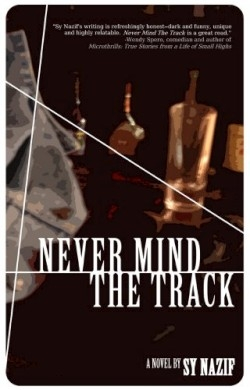
Never Mind The Track
Browsing a bookstore some time ago this reviewer chose physicist Richard Feynman’s The Meaning of It All. The cashier at checkout picked up the 122-page book turned it over set it down. “Somehow” he said “I thought it would be thicker.” Sy Nazif’s slim debut novel from the very first page has the promise of uncovering the “meaning of it all” for those who have found it difficult to stay on the track. As the author says “There has to be a better path than the straight and narrow.”
Never Mind the Track (which emphatically disclaims on the first page that it is not a memoir) begins in Pittsburgh in the mid-eighties when protagonist Eddie is eleven years old and suffering from lack of age-appropriate vocabulary. This hilarious and humiliating episode propels him to the conclusion that he’d better cool up quick and the quickest way to cool is through his older cousin Mark the coolest kid on earth. Lessons in dress comportment drinking driving and sex are all forthcoming.
By the time Eddie’s getting ready to leave for college his younger brother Eric has assumed the role of mentor. A week before his departure the two under-aged brother’s are doing “car bombs” in a local (and complicit) pub complete with oaths and sound-effects.
“So I was thinking…” [says the brother and instigator]
“Spit it out what’re you thinking?” I asked.
Café?
At first this seems a pretty random idea but it soon becomes clear that it’s once again all in the vocabulary. What is café? It’s racing a bike through town in the dark in the rain in traffic over traffic. It’s “[t]he race to escape adulthood escape the responsibility of college…. The café was an escape if only for twenty minutes.” These late night rides are some of the best writing in the book. Nazif’s affection (and respect) for the bikes and the road are undeniable. There are lots of personal notes on the qualities of particular bikes as well as exciting emergency time-outs—with a stapler on flesh.
Two years later Eddie’s Duke University experience ends in failure i.e. Duke fails to meet Eddie’s standards so he drops out. Anyway he’s smarter than his profs and he certainly wasn’t interested in playing sheep to someone’s shepherd. “That’s why I couldn’t keep one track; that’s why I couldn’t commit to one area of study.” He sells everything hops on his bike and heads out on the road a Bruce Springsteen song providing the soundtrack “…about loss of joy and loss of purpose and running with no destination or hope….” Then to his surprise in a freeway gas station one of those pivotal moments that could happen anytime anyplace he meets the girl of his dreams.
Nazif’s title and inspiration derive from gonzo reporter Hunter S. Thompson. “Never mind the track. The track is for punks. We are Road People. We are Café Racers.” At the end of the book as Eddie rides off into a Tequila Sunrise “…running from responsibility and exhaustion and the doldrums of everyday life…” the reader can only hope that a real Eddie really is out there riding carefree owner of nothing and his integrity singing to Springsteen never looking in the rear-view mirror.
Reviewed by
Heather Shaw
Disclosure: This article is not an endorsement, but a review. The publisher of this book provided free copies of the book and paid a small fee to have their book reviewed by a professional reviewer. Foreword Reviews and Clarion Reviews make no guarantee that the publisher will receive a positive review. Foreword Magazine, Inc. is disclosing this in accordance with the Federal Trade Commission’s 16 CFR, Part 255.
